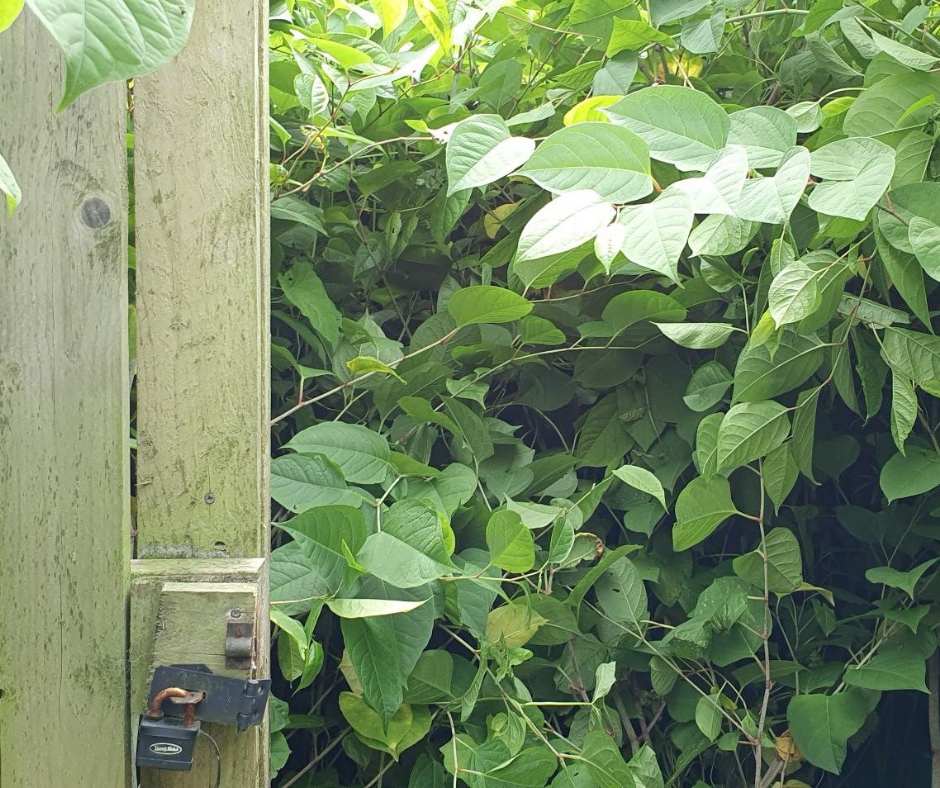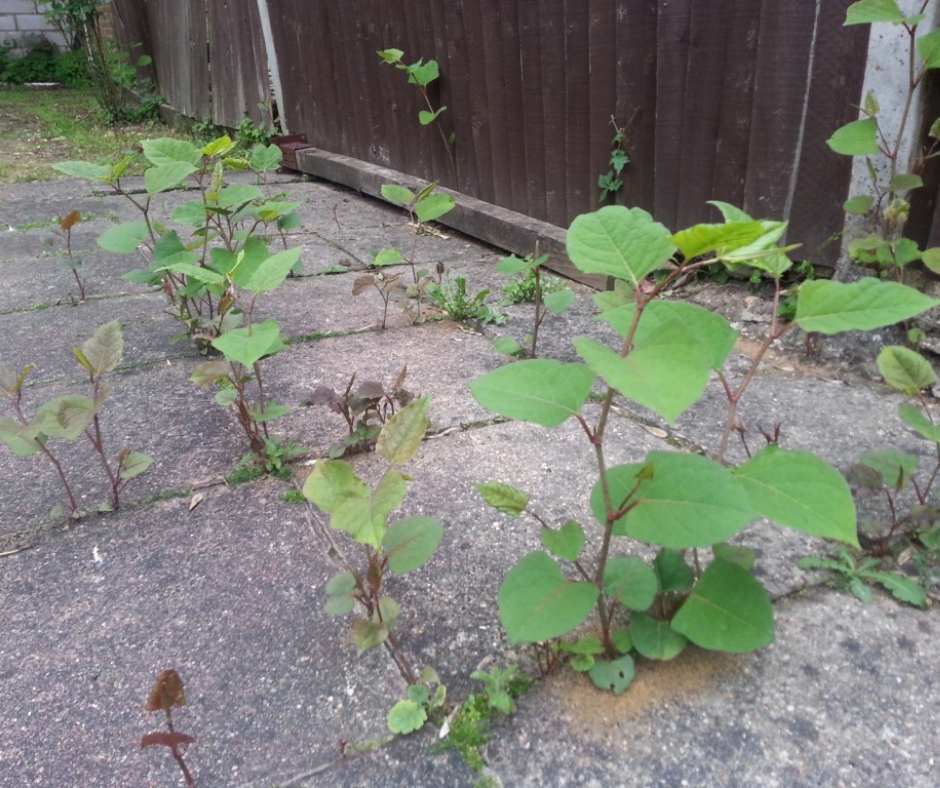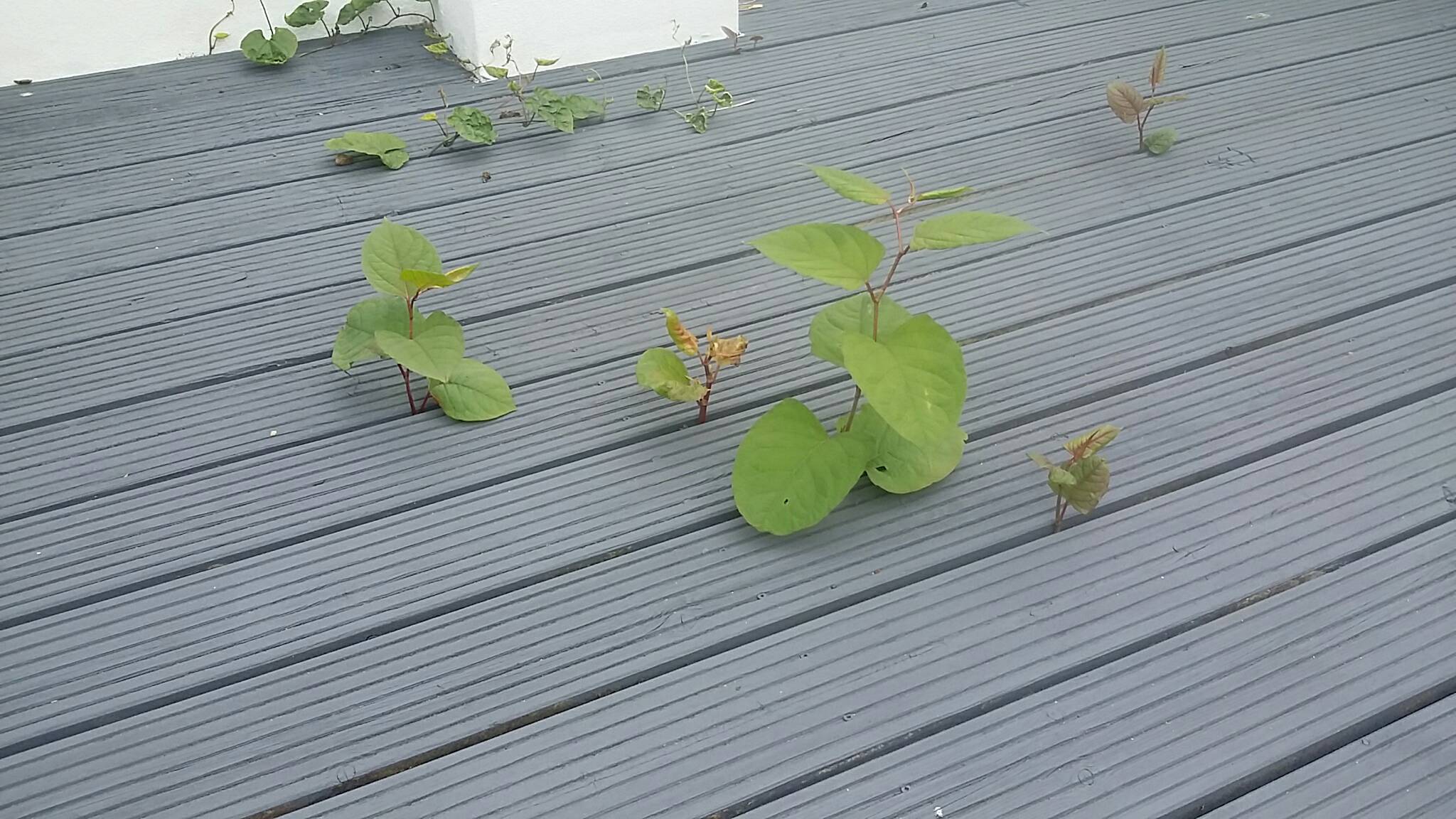Why choose us
Not all Japanese knotweed contractors are the same, have the same resources, equipment or training. Find out why over 7,000 clients choose and trust us to get rid of their knotweed.


Japanese knotweed law affects anyone with knotweed on their property or land. Here we explain the legal implications, what you should do if you have knotweed, or if you spot knotweed in your neighbour’s garden.
One of the most asked questions; “Is Japanese knotweed illegal in the UK?” The simple answer is “no“, Japanese knotweed law states it is not illegal to have Japanese knotweed on your land or property, however there are legal consequences if you allow it to spread from your property to another outside of your land’s boundaries.
You may also be at risk of being prosecuted if found guilty of disposing Japanese knotweed in the wild as knotweed is deemed as ‘controlled’ noxious waste and therefore has legalities around its disposal.
This page covers everything you need to know about knotweed law, including:
If you have Japanese knotweed on your land or property (even if you do not reside there) Japanese knotweed law states you are responsible for controlling it. Control could be via a herbicide management plan or eradication via excavation. Most importantly it must NOT be allowed to spread – and that’s the full responsibility of the home or land owner. Failure to do so will result in problems and possible legal issues, as listed below, and starting with the most common – encroachment. Japanese knotweed spreading from a neighbour’s garden is their responsibility however you could take action if you suspect it is encroaching onto your land (more on this below).
Japanese knotweed law states that if knotweed is allowed to spread beyond the property boundary this is deemed as “encroachment” and this applies even if just the underground rhizome (root) of the plant is found to have spread from one property to another. This means if a property has knotweed growing on their land they should make every effort to control all parts of the knotweed plant.
If Japanese knotweed spreads from one property to another the relevant law is that of “private nuisance”, which is defined as “an act or omission which is an interference with, disturbance of or annoyance to a person in the exercise or enjoyment of his ownership or occupation of land”.
Actionable private nuisance claims can be served against persons found responsible for having allowed or caused Japanese knotweed encroachment to take place.


Increasingly, we’re contacted by homeowners that suspect they have knotweed encroachment from railway lines close to their property. Not only does this cause for concern for the buildings on their property, but the invasive nature of the weed can cause loss of their amenity space. We have a vast amount of experience in dealing with these types of cases. Contact us using the form on this page and we’ll call you to discuss your situation and inform you of the options available to you.
In July 2018, the case of Williams and Waistell v Network Rail was heard at the Court of Appeal, as Network Rail had appealed against the original verdict. The Court of Appeal unanimously upheld the decision of the Recorder but held that the claimants cannot claim in private nuisance merely because of the diminution in the properties’ market value because of lender caution in such situations. The claimants can claim, however, in respect of the encroachment of Japanese knotweed rhizomes because they have diminished the claimants’ ability to enjoy the amenity and utility of their respective properties. The Japanese knotweed and its rhizomes presence impose and immediate burden on landowners who face an increased difficulty in their ability to develop, and in the cost of developing, their land, should they wish to do so, because of the difficulties and expense of eradicating Japanese knotweed from affected land. In this way, Japanese knotweed can fairly be described as a natural hazard that affects landowners’ ability fully to use and enjoy their property and, in doing so, interferes with the land’s amenity value.
Preventing the spread of Japanese knotweed is every home or landowner’s responsibility according to Japanese knotweed law. When knotweed is allowed to spread the following actions can be taken.
If you wish to take up a knotweed issue against your neighbour, the individual or organisation responsible for the adjoining land must be given the opportunity to deal with the nuisance (knotweed). It is therefore important that you put your neighbour(s) on notice in writing as soon as you become aware of encroachment and that you state what action you require the landowner to take and by when.
In these circumstances, you should ask your neighbour to effectively treat the knotweed not only on their land but also on your property in order to solve the problem and ideally the remedial action they choose should include a suitable guarantee. The letter should also explain the likely consequences if they choose to ignore the notice.
To help you take this further we can undertake a specialist survey of the knotweed. Ideally, we would need access to all of the affected garden(s). The survey will provide you with a written document that will accurately identify the knotweed and its location. If it is clear that the knotweed in your garden is encroachment from an adjoining property we will confirm the encroachment and you will be able to provide this as evidence to the neighbouring landowner.
Find out more about our Japanese Knotweed Survey here.
Should the neighbour not comply with the notice you have provided in writing, a claim for “nuisance for encroachment” can be pursued through legal channels. You will need clear evidence of the knotweed having derived from your neighbour’s land into yours. If you undertook a professional survey to establish the extent of the encroachment this is ideal for use in your claim. If not, we recommend having a survey completed before you start your claim so that you have all the evidence required. We can provide you with that, simply request a survey.
The government has reformed the Anti-social Behaviour, Crime and Policing Act 2014 so that community protection notices can be used against individuals who are acting unreasonably and who persistently or continually act in a way that has a detrimental effect on the quality of life of those in the locality. The Act does not explicitly refer to Japanese knotweed or other similar invasive non-native plants, as the new anti-social behaviour powers are intended to be flexible. However, frontline professionals can stop or prevent any behaviour that meets the legal test in the powers.
Under the Act a Community Protection Notice (CPN) can be used to require someone to control or prevent the growth of Japanese knotweed or other plants that are capable of causing serious problems to communities. The test is that the conduct of the individual or body is having a detrimental effect of a persistent or continuing nature on the quality of life of those in the locality and that the conduct is unreasonable. Under section 57 of the Act, “conduct” includes “a failure to act”. A CPN could therefore be used to require someone to control or prevent the growth of Japanese knotweed or other plants that are capable of causing serious problems to communities.
This means if an individual, or organisation is not controlling Japanese knotweed or other invasive plant and could be reasonably expected to do so, the CPN could be used after a mandatory written warning has been served beforehand to get them to stop the anti-social behaviour. Breach of any requirement of a community protection notice, without reasonable excuse, would be a criminal offence, subject to a fixed penalty notice. On summary conviction, an individual would be liable to a fine not exceeding £2,500. An organisation, such as a company, is liable to a fine not exceeding £20,000.
When buying a property, the person you are buying from is required to disclose on the TP1 form if the property is affected by Japanese knotweed. If you have bought a house that’s affected by Japanese knotweed, and you are able to show the seller lied about Japanese knotweed affecting the property, you can pursue a claim of misrepresentation against the seller.
As experts in the field of Japanese knotweed we can assist with legal claims regarding Japanese knotweed, contact us for more information and advice.

The answer is yes. Failure to do so will have legal consequences, and as several reported and published cases have shown the bill could run into multiple £1,000s (in some cases over £30,000!
When you sell a property you will be required to complete a legal the TP1 form as part of the transaction documentation. The question you need to look for on the TP1 form reads thus:
“Japanese knotweed is an invasive plant that can cause damage to property. It can take several years to eradicate.” It then asks sellers: “Is the property affected by Japanese knotweed?”
To which there are three possible answers:
Yes
Yes is chosen when the sellers are aware of the presence of knotweed affecting the property. Here they are prompted to provide copies to the buyer of any knotweed management plan and evidence of insurance cover relating to the plan.
Not Known
This is chosen if the seller is unsure that knotweed exists above or below ground or whether it has previously been managed on the property.
No
No can only be chosen if the seller is certain that no rhizome (root) is present in the ground of the property, or within 3 meters of the property boundary even if there are no visible signs above ground. Therefore, all sellers should be choosing either the “Yes” or the “Not Known” options.
The presence of knotweed does not automatically prevent a mortgage from being obtained, with a case by case basis approach often adopted. Evidence of a suitable Knotweed Management Plan is paramount. Whilst it might be a shock to find out that the property you are trying to sell has knotweed, or indeed, the property you intend to buy is affected, there are treatments available to manage the infestation and the Knotweed Management Plan is the key in evidencing this when applying to lenders.
As stated above, when buying a house, the person you are buying from is legally required to disclose if the property is affected by Japanese knotweed. If you have bought a house that’s affected by Japanese knotweed, and you are able to show the seller knew about Japanese knotweed on the property, you can sue the seller. There will be legal costs associated with this however, if you are certain that you have the evidence to prove knotweed was not disclosed on the legal documents, you have a strong claim.

If a property is found to have an infestation of Japanese knotweed or is within 7 meters of the property, it may cause loss or devaluation of the property, as it may be more difficult for purchasers to secure a mortgage. This is called diminution of value, and if you are successful in bringing a Nuisance Claim against a defendant, then it may be possible to include a claim for diminution of value in any settlement.
If you purchased a property and paid for a professional survey to be carried out and the surveyor did not pick up the presence of Japanese knotweed, you may be able to bring a claim against the surveyor for “professional negligence”. If you are able to show that the surveyor should have noticed the knotweed, you can make a claim.
When developing a site affected by Japanese knotweed, if the necessary due diligence and control of Japanese knotweed has not been undertaken, the developers risk legal action for professional negligence. Ignoring knotweed can result in regrowth during or after construction, appearing through hard and soft landscape areas on the purchaser’s property which will require treatment or removal.

The Government website has guidance called “Prevent Japanese knotweed from spreading“. It states:
“You must dispose of Japanese knotweed waste off-site by transferring it to a disposal facility that’s permitted, e.g. a landfill site that has the right environmental permit.”
“You must prevent Japanese knotweed on your land from spreading into the wild and causing a nuisance. You could be fined up to £5,000 or be sent to prison for up to 2 years if you allow contaminated soil or plant material from any waste you transfer to spread into the wild.”
This means if you cut back knotweed or dig it up and take it to your local waste and recycling centre that does not have the right environmental permit, you could be fined or sent to prison.
The Government website continues to state:
“You must not:
You can only reuse knotweed-contaminated soils after treatment, on the site where they were produced.”
At Japanese Knotweed Ltd, we are fully equipped and highly trained to deal with Japanese knotweed infestations. Our team of field technicians have the relevant qualifications and experience to treat Japanese knotweed in a professional and legally compliant manner. If you suspect you have knotweed on your property, call in Japanese Knotweed Ltd, your local knotweed experts today: 0333 2414 413.
The Wildlife and Countryside Act 1981 provides the primary control for the release of non-native species into the wild in Great Britain. It is an offence under Section 14(2) of the Act to “plant or otherwise cause to grow in the wild” any plants listed in Schedule 9, Part II.. Read more about the Wildlife and Countryside Act 1981.
The disposal of Japanese knotweed and other invasive weeds listed under section 14(2), schedule 9, part II of the Wildlife and Countryside Act, is legislated. Under the Environmental Protection Act, waste containing the propagules of these plants is classified as controlled waste if removed from site of origin. This requires the waste to be transported only on Environment Agency registered waste carrier vehicles and disposed of at specially licensed landfill sites (of which there are limited numbers in the UK).
Where there is an option to retain or dispose of these wastes on-site, it needs to be done in accordance with the Government’s Regulatory Position Statement (RPS) number 178. This controls how the waste can be kept and disposed of on-site, with specifications for burial, relocation and re-use.
This Act exists to ensure responsibility is taken by the producers of waste (such as Japanese knotweed) for managing their waste and avoiding harm to human health or the environment.
The Act aims to reduce or eradicate harmful acts of waste crime, such as fly-tipping. The Duty of Care incorporates a responsibility on anyone who produces, imports, carries, keeps, treats or disposes of controlled waste to ensure it is only ever transferred to someone who is authorised to receive it. Read more on The Environmental Protection (Duty of Care) Regulations 1991.
